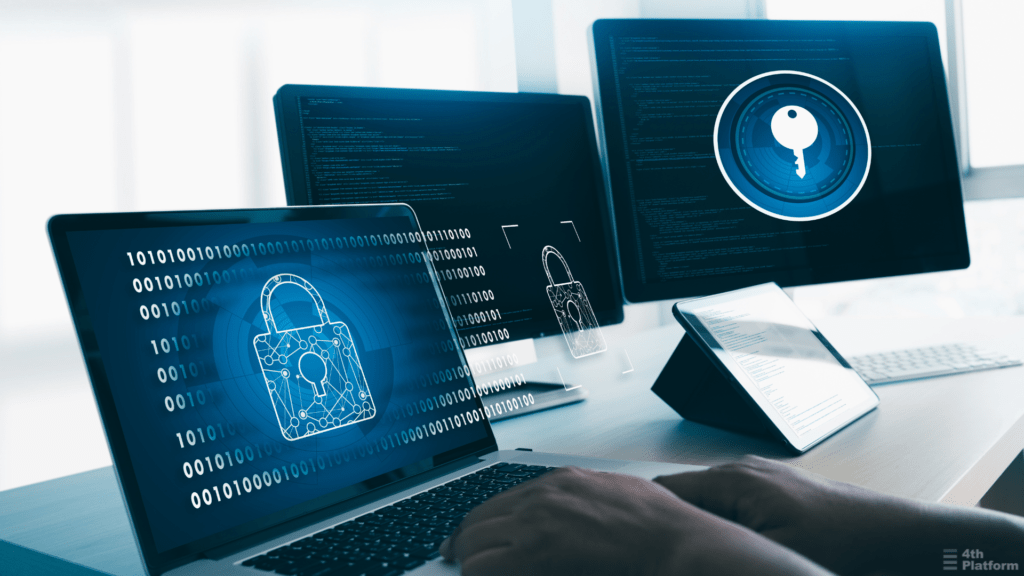To say that endpoints are vulnerable would be an understatement. According to Verizon, 90% of successful cyberattacks and as many as 70% of data breaches originate at the endpoint. Clearly, it’s essential for all businesses to secure their endpoints—without delay or fail.
The information for this blog was sourced using GoTo. You can read it here
What is Endpoint Protection?
An unsecured endpoint provides cyber criminals with the opportunity to access unauthorised networks, steal or corrupt company data, or install malware and viruses. These attacks can be external or come from insider threats, targeting mobile devices, desktop computers, virtual machines, embedded devices, or servers.
Endpoint protection (also known as endpoint security) involves monitoring and protecting endpoints against cyber threats. More specifically, endpoint protection consists of centrally managed security solutions that organisations use to safeguard endpoints against malicious actors and exploits.
The Importance of Endpoint Security
Consider today’s workforce; the Pew Research Center found that around 22 million employed adults in the U.S. work from home. This is by no means a fad, as by 2025, an estimated 32.6 million Americans will be working remotely—about 22% of the workforce. There is a clear correlation between workstyle and breaches. Over half of all companies (62%) have experienced a breach that was at least partially due to remote working in the past three years.
Bring-your-own-device (BYOD) policies have exacerbated vulnerabilities, allowing employees to use their personal smartphones, tablets, laptops and wearables to access enterprise data from anywhere. A lack of adequate network security and weak remote access authentication has given hackers an entry point into organisational networks and data.
Yet despite the increase in security risks associated with remote working, only 47% of organisations monitor their networks 24/7, and only 50% encrypt sensitive data stored on devices. Additionally, less than half of businesses monitor their network and protect company-owned devices with up-to-date antivirus software, device encryption, and firewalls. This is not a smart strategy as cyberattacks become increasingly sophisticated.
Types of Endpoint Attacks
Businesses generally face six types of cyberattacks on endpoints:
Phishing – A hacker uses social engineering tactics to trick the target into handing over sensitive information or downloading malware.
Ransomware – Malware prevents an organisation from accessing its information, systems, data, or networks until a ransom is paid.
Distributed-denial-of-service (DDoS) attacks – Disrupts the normal traffic of a targeted website, server, or network by overwhelming it with a flood of internet traffic.
Botnet – A group of internet-connected devices are compromised and controlled by a malicious cybercriminal. This can include anything from CCTV cameras and smart home appliances to smartphones and tablets.
Drive-by download – Involves unknowingly clicking on a malicious link or downloading malware to a device that leaves the target vulnerable to an attack.
Outdated security – Unpatched security vulnerabilities are a prime target for outside threats.
A Very High Price to Pay
Did you know that 43% of cyberattacks are aimed at small businesses and only 14% are prepared, aware, and capable of defending their networks and data? These attacks come at a very high price—IBM found the average data breach costs companies $4.45M. Breaches involving remote work—the prime reason for unsecured endpoints—cost an average of $1.05 million more. That’s a very high price to pay for an attack that could potentially be circumvented. The loss comprises customer turnover, system downtime, and the cost of acquiring new business due to a tarnished reputation, all taking a significant toll on the bottom line.
Next Steps for Businesses
So what can businesses do for endpoint security protection? Rule of thumb: act proactively rather than reactively. A solution must be put in place before an attack hits. This includes conducting a vulnerability assessment to identify security gaps that put endpoints at risk and patching everything early and often.
How 4th Platform Can Provide Endpoint Protection
4th Platform offers robust endpoint protection solutions tailored to meet the needs of modern businesses. Our comprehensive endpoint security includes the following features:
- Centralised Management: Manage all endpoints from a single, unified dashboard, providing IT teams with a holistic view of the security landscape
- Real-time Monitoring: 24/7 network monitoring to detect and respond to threats swiftly, ensuring minimal disruption to business operations
- Advanced Threat Protection: Utilise cutting-edge technology to protect against sophisticated cyber threats, including ransomware, phishing, and zero-day attacks
- Device Encryption: Ensure that all sensitive data on devices is encrypted, adding an extra layer of security against unauthorised access
- Automated Patch Management: Regularly update and patch systems to close security vulnerabilities and prevent exploitations
- Remote Work Security: Implement robust security measures to protect remote workers, including secure access protocols and strong authentication methods
By partnering with 4th Platform, businesses can connect, collaborate, secure their workforce, and support their employees and customers effectively. Our solutions help ensure that your endpoints remain protected, allowing you to focus on what matters most—growing your business.
Secure your endpoints today with 4th Platform—because protecting your business starts with safeguarding every endpoint.
For all businesses, agility and innovation are essential for staying competitive. But what happens when employees act faster than your IT policy can keep
Artificial Intelligence (AI) is transforming industries by improving efficiency and decision-making. However, cybercriminals are also harnessing AI to create more sophisticated and targeted cyber
For many growing businesses, having access to board-level IT leadership can make the difference between simply maintaining systems and using technology as a driver
In sectors where client trust is everything legal, accountancy, financial services the cost of a cyber breach goes far beyond lost data. It strikes
In today’s rapidly evolving business landscape, relying solely on reactive IT support can hinder your organisation’s growth and resilience. Without a strategic IT roadmap,
How 4th Platform (Powered by Gamma) keeps your business ahead with Cloud Communications. The UK’s analogue phone network is being switched off in 2027, and
Why getting your cloud setup right the first time matters more than you think. Cloud services have revolutionised how modern businesses operate offering flexibility,
Despite increased awareness of cyber threats across the legal sector, law firms continue to be prime targets for cybercriminals. These attacks are no longer
In today’s fast-paced business environment, technology is the backbone of productivity. When IT systems run smoothly, employees can focus on their tasks without unnecessary
When we think about cybersecurity threats, external hackers and cybercriminals often come to mind. However, some of the most significant risks come from within


















